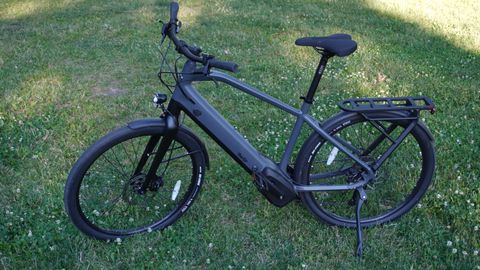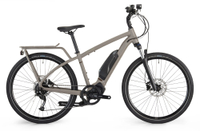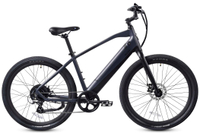TechRadar Verdict
The Ride1Up Prodigy does some impressive things for the price, namely delivering a Class 3 mid-drive motor, and it tacks on some quality parts where it counts. If you don’t mind the weight, it’s a hard bike to beat.
Pros
- +
Considerably performance
- +
Competitive price
- +
Hidden battery
Cons
- -
Heavy
- -
Stiffer ride
- -
Concerning frame flex
Why you can trust TechRadar
Size range: One size (rider heights 5’6” to 6’4”)
Motor: 90 Nm Brose TF Sprinter mid-drive
Top speed (motorized): 28mph
Power: 36V 14ah (504Wh) lithium battery
Control: Torque sensor pedal assist
E-bike classification: Class 3
Speeds: Nine-speed (46/11 max. gear ratio, 46/34 min. gear ratio)
Brakes: Tektro HD-M275 dual-piston hydraulic disc brakes
Frame material: Alloy
Fork material: 6061 Aluminum Alloy
Wheel size: 27.5” x 2.0”
Weight: 56.6 pounds (measured)
Range: 30-50 miles (rated); 27.6 miles (tested)
Weight capacity: 300 pounds
Ride1Up Prodigy: Two minute review
This is TechRadar's Ride1Up Prodigy full review, with its XR frame. As a mid-range bike, we were surprised to find the Ride1Up Prodigy truly fronts with quality components and some serious power.
The best electric bikes make getting from A to B a breeze, whether it’s a straight shot, a hilly journey, a considerable trek, or a jaunt through the meanderings of a city. The Ride1Up Prodigy aims to go a long way in delivering that versatile experience at a shocking value. It’s packing in a lot of goodies for an electric bike at just $2,295. While there are plenty of cheaper options out there (just check out our list of the best cheap e-bikes for a few examples), some of them tend to skimp on features to bring that price down, or even in some cases opt for cheaper parts or weaker components.
Not so here. Allow us to get technical for a moment: you’ll find a drivetrain using a 9-speed Shimano Alivio derailleur and cassette to provide lots of options and a comfortable ride for flat speed and leverage on hills. Tektro hydraulic disc brakes are a step above the single-piston mechanical disc brakes found on a lot of cheaper e-bikes. Ride1Up also throws lights, a rear rack, and front and rear fenders onto the bike to deck it out.
The star of the show in the Prodigy is of course its electric system, which combines a deliciously powerful Brose TF mid-drive motor offering 90Nm of torque with a roughly 500Wh battery. The combo provides plenty of speed, topping out at 28mph, and gets good range out of the battery. At this price, it’s rare enough to find a mid-drive motor that benefits from being able to apply its power to the multi-speed drivetrain, let alone to find such a powerful one.
The bike is pretty hefty given all its packing in, plus the added weight that tends to come with electric bikes. It weighs in at 56.6 pounds, enough to make it a pain to get up or down stairs, and a bit of a nuisance to ride without motor power.
But, with the motor, it’s an enjoyable ride. It offers an upright riding position that’s comfortable, though can put a bit too much weight into the sit bones for extended riding. The torque sensor does a good job responding to input, making for natural pedaling that doesn’t get jerky with the motor kicking in.
Whether casually cruising at a low assist setting or flying down the road in its "Turbo" setting, the Ride1Up Prodigy puts its power to good use. And even when using the bike fairly egregiously (a lot of high-speed riding with a heavy payload), it can muster a respectable range – going over 26 miles on a single charge during our testing all while providing conservative estimates on the range, which helped us avoid getting stuck partway through a ride with a dead battery.
There are better bikes out there, like the Specialized Turbo Vado 4.0, but they tend to cost considerably more — $4,000 / £3,900 / AU$5,000 in the case of the Specialized. Meanwhile, Ride1Up shows its admirable value against a bike like the $4,000 (about £3,000 / AU$5,500) Bluejay Sport, which it closely matches in riding experience while even edging it out in design thanks to a hidden battery pack.
For $2,295, mid-drive e-bikes aren’t really coming any better than this. The Marin Sausalito E1 comes close, but it’s trailing far behind in performance as a Class 1 e-bike topping out at 20mph and still costs a little more.
Ride1Up Prodigy: Price and availability
The Ride1Up Prodigy with the XR frame we tested or with a step-through frame is available now for $2,295 in the United States. There’s also an XC model available for $100 more, which opts for more mountain bike components, like hydraulic shocks on the fork, and ditches the cargo racks.
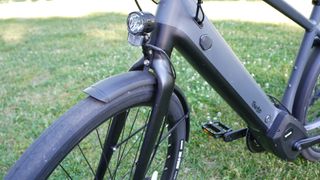
Ride1Up Prodigy: Design
- Decked out
- Heavyweight at 56.6 pounds
- Semi-stealthy
The Ride1Up Prodigy is about as decked out as you can ask a bike to be. Fenders? Yep, it’s got metal ones. A carrier rack? There’s a hefty one in the back that can haul up to 40 pounds, though it’s worth noting that it’s integrated with the rear fender. There’s an adjustable headlight and a tail light, both powered off the bike’s battery, though these kinds of included lights are rarely as bright as we’d like them to be. There’s also a kickstand attached far enough back that it never gets in the way of the pedals. The bike also has two sets of water bottle cage bosses in the frame. It feels like the one thing the bike is missing is a bell.
Then there’s the hardware the bike is kitted out with. Ride1Up has opted for Tektro hydraulic brakes with 180mm discs. The calipers have dual pistons, helping make adjustments to the brakes easier. There’s a 9-speed Shimano Alivio transmission all managed by a rear derailleur and an integrated shift sensor.
The bike has some bulk as a result of all this gear as well as the electrical components. We weighed it at 56.6 pounds, so it’s a good thing it’s packing in a Brose mid-drive motor with up to 90Nm of torque. That motor’s activated with an integrated torque sensor and powered by a roughly 500Wh battery hidden away inside the downtube. You can remove the battery with a key, though it takes some finagling to undo a latch that keeps that battery from simply falling out when you turn the key. You can recharge the battery while it’s in the bike or when it’s outside the bike.
While the battery doesn’t have a visible charge meter when it’s slotted into the bike, battery levels can be monitored on the 1.5-inch color LCD display, which also provides plenty of other metrics. Given all the various components connected to the bike and the added complexity that comes with electronics, the Ride1Up loses a bit of its elegance to all the cables running to and fro. It’s a proper mess in front of the handlebars.
The size and weight of the Prodigy make it a bit of a drag to deal with in an upper-floor apartment, but those with garages won’t regularly have to contend with its bulk.
Ride1Up has thrown on comfortable, ergo hand grips and a slightly plush seat. The upright riding position of this bike especially benefits from that seat padding. We’re riding with the seat just about as high as it can go, and we’re still not leaning forward enough to put much weight into our hands.
The bike rides on 27.5 x 2.0-inch Maxxis Refuse wheels that, though large, are actually slicker than the mountain bike-style tires we’d expect. However, since this bike is meant for the roads, it makes sense.
Given the complexity of this bike, the pain of it being a direct-to-consumer bike is all the easier to feel. While assembly isn’t all that involved — attaching the handlebars, bolting on the front fender, screwing on the pedals, and slotting in the front wheel — there’s just that much more that can be not quite right from the get go. Our brakes needed adjustment to keep from rubbing and our rear derailleur was skipping one of the larger cogs every time until we re-indexed it.
The front fender also has a very narrow tolerance between its side supports and the front wheel, making rubbing a constant risk. These adjustments can take some time if you do them yourself, especially if you’re new to bike maintenance, or they can add a little extra to your cost at a bike shop (probably not more than $50 for the adjustments mentioned).
Design Score: 3.5/5

Ride1Up Prodigy: Performance
- Class 3 speed
- Stiffer than expected
- Natural feeling
The Ride1Up Prodigy puts on a strong show when it’s out on the road. Almost all the mid-drive e-bikes we can find that come anywhere close to this price are Class 1 with a top speed of 20mph, but the Brose TF motor on the Prodigy is more than up to the task of going faster. In its second-highest mode, Sport, it’s ready to help push past 20mph with ease and can do a lot of comfortable riding just setting in fifth gear. 28mph actually proved more difficult to get to, but 27.5mph wasn’t so tough with the bike in its most powerful setting.
At those faster speeds, there is the matter of comfort. The bike rides plenty steady, but the upright riding position puts a lot of weight right into the seat and that leads to all the shocks and bumps of the road going right into the sit bones. This is a bike you’ll absolutely want to raise up slightly on when you see a bump coming up.
Despite the perceived stiffness of the ride, the bike shows some clear flexibility when we’re riding, with the frame bending slightly with firm pedalling. This isn’t unusual for a bike, but after about a 100 miles of riding, the motor/bottom bracket started groaning whenever we pedal with much pressure. It’s unclear whether this is an issue with the frame or motor not holding up to the pressure we’d applied or simply a production fault, but something like this may be covered under the one-year warranty Ride1Up includes. Annoying as the sound is, it doesn’t slow down our rides noticeably.
Creaking aside, the bike has enough gear range and enough assist settings to make for some smooth riding. Pedalling feels natural thanks to the torque sensor, and the motor never feels like it’s doing all the work for us. Some riders might prefer a motor that’s going to do all the work, but the Brose motor here will do a ton of work, making a steady 20-25mph as easy as a casual 10mph would be on an non-electric bike.
On the flipside of speeding up there’s slowing down. The hydraulic disc brakes don’t always feel that powerful, with a gentle pull slowing the bike down rather gradually. But with a forceful squeeze, the brakes can really bike into the disc and bring the bike to a screeching halt. On one of our rides, we were hauling along near the bike’s top speed when a rat ran out in front of us, and the brakes where strong enough to slow us down in a hurry, though the tires skidded a bit.
Performance score: 4.5/5
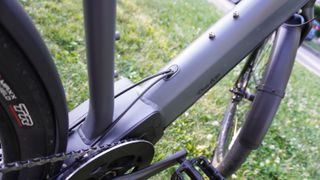
Ride1Up Prodigy: Battery Life
- 504Wh put to good use
- Useful range estimates
The Ride1Up Prodigy isn’t decked out to have the longest range. A roughly 500Wh battery isn’t there to break records. But the Prodigy uses its power well. We largely ride with e-bikes in their higher assist settings, and with a combo of its "Sport" and "Turbo" modes, we took a solid 27.6-mile adventure.
Near the end of the ride, the bike was suggesting only another mile of range, but we kept on winding around the neighborhood and it just wouldn’t give out, proving it offers somewhat conservative estimates that help avoid finishing up rides on a dead battery.
Across our testing, the battery maintained this level of performance, so Ride1Up’s estimate of 30-50 miles of range ring true, as the lightest assist level and lighter riders would very likely eke out considerably more range than we did operating at high assist levels and carrying upward of 240 pounds on the bike.
Battery life score: 4/5
Ride1Up Prodigy: Value for money
- Affordable for a mid-drive
- Very affordable for a Class 3 mid-drive
The question of value comes down largely to what you’re hoping to get for your money. You can get some excellent road bikes for $1,000, but you’ll be pedalling entirely under your own power. There are also some solid electric bikes that offer a fun and easier riding experience for under $1,500, including Ride1Up’s Roadster V2.
But, if you’re looking for a relaxed ride that feels natural while having all the extra power available from a mid-drive e-bike, you’re not going to find much that can compete in value against the Prodigy. The only Class 3 mid-drive e-bike we could find that cost anywhere close to it was the cheaper, Lectric XPremium folding e-bike, which would offer a significantly different ride.
Value for money score: 4/5
Buy it if...
You want an affordable mid-drive system
There aren’t many mid-drive e-bikes coming in at a price close to the Prodigy, and there are almost none that’ll let you go 28mph and get as much muscle out of them. This is an exceptional value.
You like putting a little work into your rides
While the Brose motor can significantly increase the power going into your back wheel, you’ll still be putting in some work yourself. So you can still get a nice little workout during your ride, you’ll just get to go extra fast.
You don’t want to fuss with accessorizing
The Prodigy comes with plenty of kit. You might have to pick out your own panniers, but Ride1Up has you covered for fenders, lights, and a rack.
Don't buy it if...
You don’t want a heavy bike
The Ride1Up Prodigy may make up for its weight with motor power, but if you have to carry it often or run out of battery, you’re going to have to contend with that weight.
You don’t want to go fast
Part of what the Prodigy is selling is its Class 3 capabilities. If you don’t want that speed or legally can’t use it, there are cheaper options to fit the bill.
You want effortless riding
There’s no throttle on this bike. You’re meant to pedal, and it’s meant to multiply your force. If you sometimes want to kick back and, you can get much cheaper bikes with rear hub motors and throttles for effortless riding.
Also consider:
Whether the Prodigy is too much bike or too much money, we’ve know of a few alternative options that might be a better fit.
<a href="https://classic.avantlink.com/click.php?tt=cl&mi=10248&pw=27131&ctc=hawk-custom-tracking&url=https%3A%2F%2Fwww.rei.com%2Fproduct%2F172495%2Fco-op-cycles-cty-e21-electric-bike" data-link-merchant="rei.com"" target="_blank" rel="nofollow">REI Co-op Cycles CTY e2.1
REI’s in-house Co-op Cycles brand offers serious value, and the CTY e2.1 is one of the more affordable mid-drive bikes you can find. It’s only bringing Class 1 speed, but it’s otherwise kitted out similar to the Prodigy.
<a href="https://www.techradar.com/reviews/ride1up-core-5" data-link-merchant="techradar.com"">Ride1Up Core 5
You can go just as fast and nearly as far with the <a href="https://www.techradar.com/reviews/ride1up-core-5" data-link-merchant="techradar.com"" data-link-merchant="techradar.com"">Ride1Up Core-5. This Class 3 e-bike saves you a bunch though by opting for a cheaper hub motor and more basic gears and brakes. It also has a throttle for effortless riding.
First reviewed June 2022
Over the last several years, Mark has been tasked as a writer, an editor, and a manager, interacting with published content from all angles. He is intimately familiar with the editorial process from the inception of an article idea, through the iterative process, past publishing, and down the road into performance analysis.
